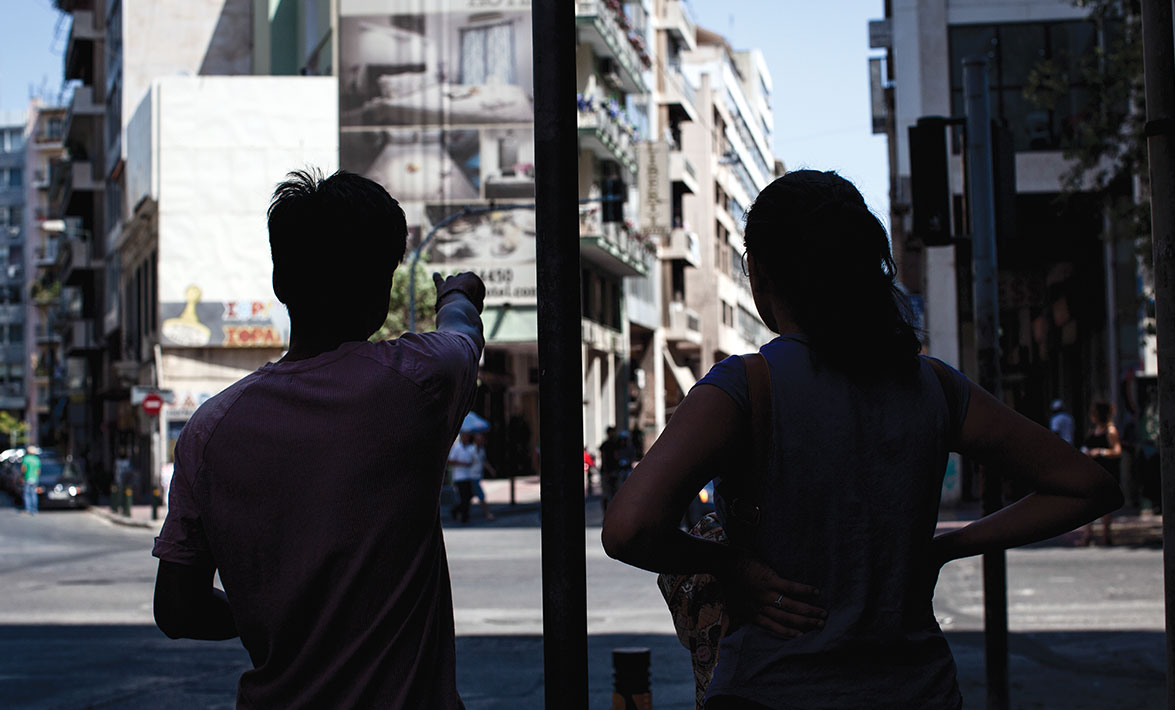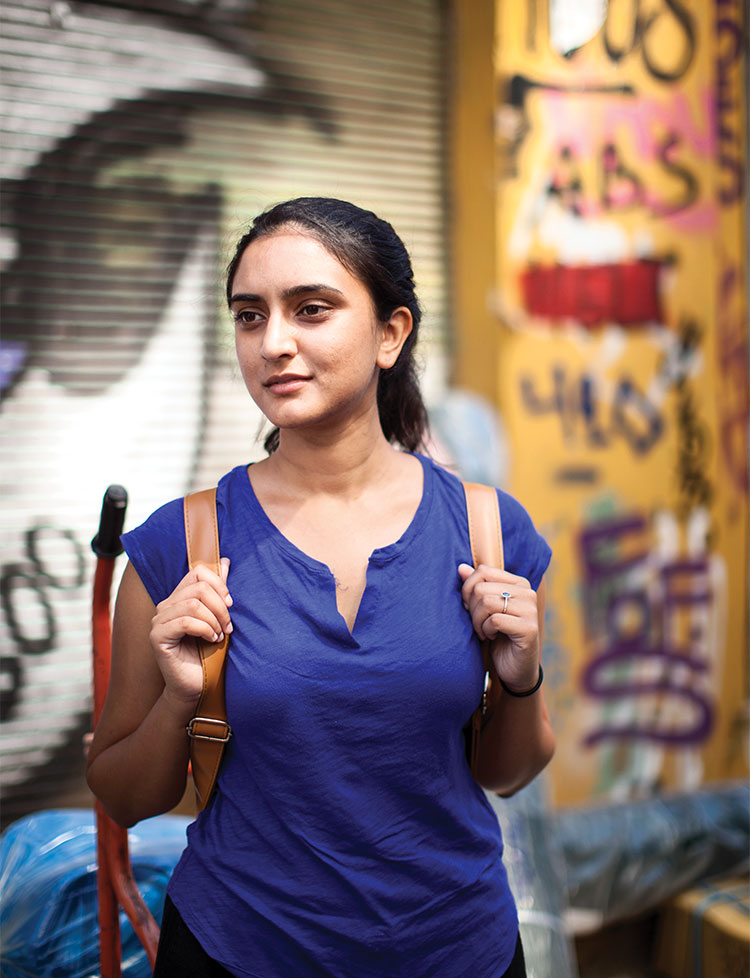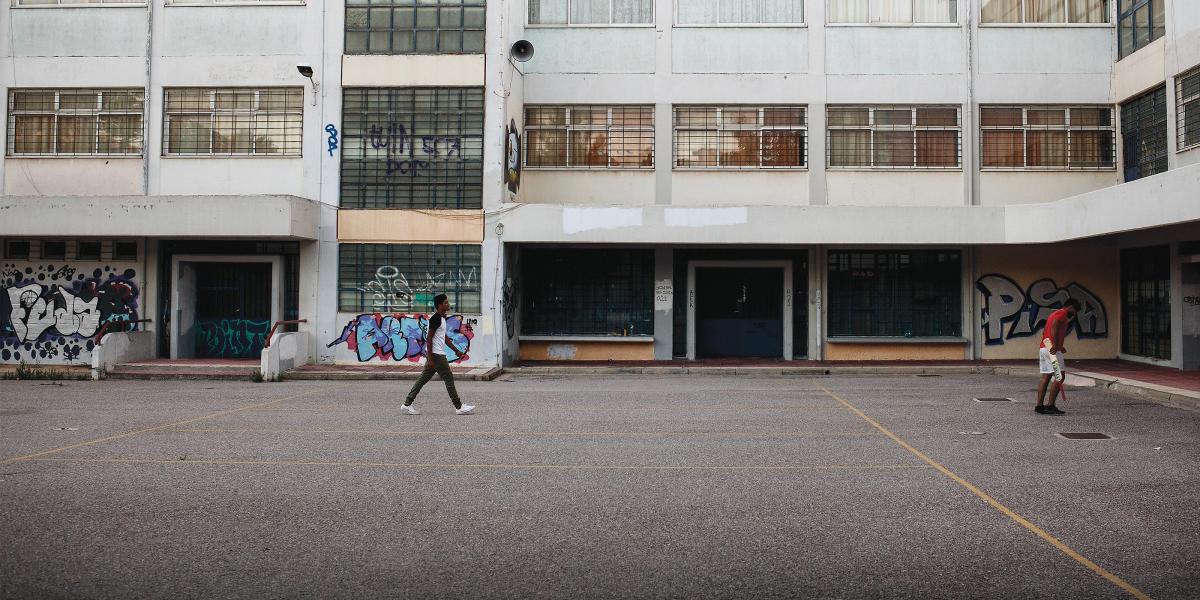In Greece, Unaccompanied Minor Refugees Fall through Service Gaps
In Greece, refugee boys and young men must navigate meager services, high risks and slim hopes.
In a fly-infested kitchen at the Thiva refugee camp about 50 miles from Athens, Greece, 16-year-old Fayaz slices up watermelon for a snack. Tall with prominent front teeth and wearing a faded pink t-shirt, he lives in a white, trailer-like box that camp residents call containers.
Originally a textile mill, the remote facility was converted two years ago into a camp, which now houses about 800 refugees. Many of them came to Greece during the height of the European refugee crisis in 2015 and early 2016.
The influx of more than a million people strained Greece’s refugee and migrant facilities beyond the breaking point. Arrivals were held on Greek islands in overcrowded and squalid camps known as reception and identification centers, or RICs.
Fayaz was 12 when he left his home in Afghanistan in 2014 to escape a turbulent combination of family instability and political violence. Traveling through the same illegal immigration networks that Afghans have used for 30 years, Fayaz arrived in Turkey. There, he got a job working 14 hours a day in an electronics factory.
In April 2016, he boarded a fragile boat on Turkey’s Aegean coast. Crowded with fellow immigrants, it set out on the perilous journey to Greece. Since arriving on Lesbos island, Fayaz has been shuttled through a series of facilities for unaccompanied minors operated primarily by NGOs—first on Lesbos, then in Athens, now in Thiva.
Two years after arriving, he hasn’t found the life he had hoped for.

A Patchwork of Shelters
Fayaz belongs to the most vulnerable of refugee groups in Greece: the 3,600 unaccompanied minors. As soon as they reach Greek shores, most UAMs begin their odyssey through the child protection system at chronically under-resourced RICs. The next move might be to a shelter. Typically, these are hotels, houses or apartments managed by NGOs.
Throughout this journey, many UAMs must navigate a system of fragmented services that, according to experts, typically do not address the emotional and psychological needs associated with the trauma of leaving home and trying to survive in a new country. In fact, these experts say, such facilities can exacerbate the depression, anxiety and PTSD common to young immigrants and do little to help them transition to adulthood when they turn 18.
“They’re on the cusp of becoming adults, and if you don’t have programs to help these boys, they are very, very vulnerable,” says Paul Spiegel, MD, director of the Center for Humanitarian Health at the Bloomberg School. “Even though some of them may look like it, they’re not adults, and they may not always make the most mature decisions.”
Fayaz was kept for four months in a high-security section for UAMs at Moria, the main RIC on Lesbos. Surrounded on all sides with a barbed wire fence, the four rows of white containers housed dozens of children who slept on bunkbeds. Greek police were stationed at the gate to keep the children in, and Moria’s adult refugees out. Children were left essentially unsupervised at night.
“We lived like prisoners,” he recalls bitterly.
Save the Children and volunteers set up movie nights, art projects and trips to the beach for the minors. However, these activities did little to lift Fayaz’s spirits. His forearms bear rows of horizontal scars from cutting himself with glass. When staff discovered his injuries, they rushed him to Mytilini Hospital.
“The nurses took a long time to come around to me, and when they did, they cursed at me,” Fayaz says. “They cursed in Greek, but I could understand them.”
So many youth in Moria’s minors’ section were breaking windows and slashing their arms with glass shards that camp officials replaced the containers’ windows with plastic sheeting.
Such self-harm often reflects “despair or anger that needs to be externalized because the minor can’t bear his feelings and acts them out,” says Mado Liadopoulou, a psychologist with the Greek organization Network for Children’s Rights.
“What is happening in Greece is that organizations and service providers focus mostly on the basic needs of children—shelter, food and medical care,” says Vasileia Digidiki, PhD, MSc, an author of the Harvard Center for Health and Human Rights’ 2017 study on migrant children in Greece. “However, we tend to ignore the agency of these children, and for that reason, the interventions that we employ are not successful.”
The shelters typically do not have the resources to provide services that the minors need, notes Valia Rouni, who leads a guardianship program for Metadrasi, a Greek NGO that matches UAMs with Greek guardians. Without specialized counseling, language classes, job training and other services, many teens feel trapped and unable to visualize a future.
“We have minors who have been in a RIC for more than six months, maybe more than a year,” says Rouni. “And they’re not sure if there is an exit.”
Desperate to leave the housing and care system for UAMs, Fayaz asked his mother to send him a new tazkeera—a handwritten, widely used but loosely monitored Afghan ID card—stating that he was 18. Now an adult—on paper—he was transferred to Thiva, where he has lived for the past six months. Since the facility is far from public transportation and jobs, his hopes of going to school and finding work have dissolved. His days blur together, the monotony punctuated only by meal times.
“When I talk to my mother, she asks, ‘What are you doing there?’” Fayaz says. “I tell her that I am doing nothing.”
“The Reality Outside”
Once they age out of the child protection system—and sometimes before—some UAMs try to leave the country. Turning to smugglers or traffickers, they can find themselves in exploitative situations.
“When a smuggler promises ‘I can help you with your migration journey for €1,000 or €2,000,’ the child will try to find money,” Digidiki says. “It could be drug trafficking or drug dealing. It could be begging. It could be stealing or commercial sexual exploitation.”
Hassan, who arrived on Lesbos as a UAM from Bangladesh, spent a few months at the Moria camp before being transferred to a mainland camp in Volos, Greece, which lacked a designated section for minors. On his first day there, adults robbed him of his cell phone and toiletry items. When he sought help from camp authorities, they told him that such incidents were common and that he was free to leave the camp. A few days later, he did.
Within two months, he turned 18. As a single adult male, Hassan became the lowest priority for shelter among humanitarian organizations.
“When I left, I discovered the reality outside for the first time,” he says. “I had nothing to eat, nowhere
to live.”
He moved in with an older man, a Bangladeshi migrant, who eventually turned him out when Hassan couldn’t pay rent. With no housing and no income, Hassan found work picking strawberries on a farm in Manolada, outside of Athens. Supervisors deducted money for food, rent and supplies from his pay, quickly trapping him in a cycle of debt. When strawberry season ended, Hassan moved back to Athens to an apartment he shares with other Bangladeshi migrants.
He goes from shop to shop every day, looking for work, but has had little luck.

A Way Forward
The gaps in Greece’s safety-net protection system for young refugees are clear; however, investment in better services and more staff at RICs can pay off. Research suggests that UAMs who develop strong, positive relationships with staff in camps and shelters are more likely to build resiliency in challenging circumstances.
To that end, innovative programs that are more tailored to the needs and concerns of young refugees are critical, experts say.
A model that holds promise is the guardianship program run by the NGO Metadrasi. Each UAM is paired with a guardian from a network of social scientists, social workers, lawyers and educators, who safeguards the minor’s legal and social rights, including access to education and health. The guardians meet with the minors regularly in informal settings like cafés and parks to build a trusting relationship.
“The point is to become the person of reference for the minor,” explains Metadrasi’s Rouni. “So that can be translated as, if [the minor] has a boyfriend or girlfriend, they have someone to pick up the phone and talk to about it. Or something more serious, like ‘I’m having a terrible stomach ache and I have to go to the hospital.’ It is like forming a very personal and holistic veil around the minors.”
Many former UAMs who were enrolled in Metadrasi’s guardianship program continue to keep in touch with their guardians even after they turn 18. Some have gone to school, learned Greek and held down long-term jobs.
“I am the optimist,” Rouni says. “It is time-consuming, it needs a lot of effort, but there are success stories, and there are happy endings, and it’s what gives you the power to move on.”
